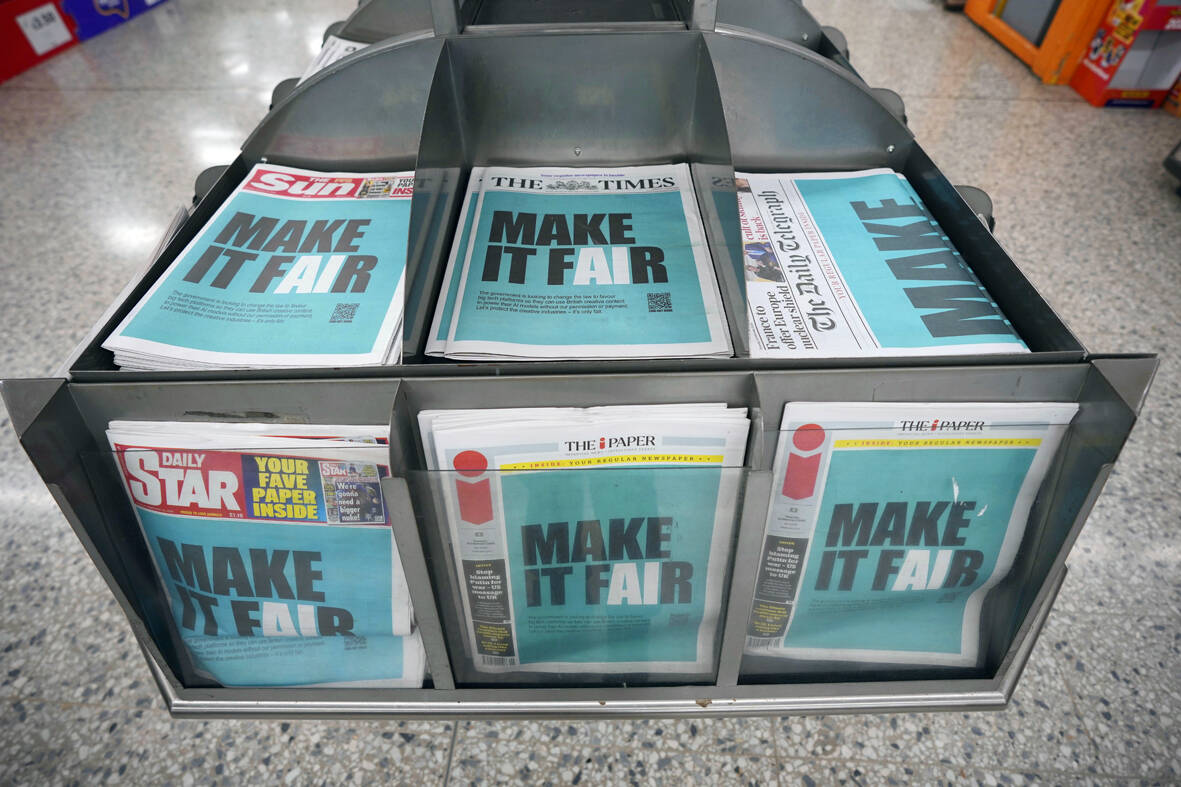More than 1,000 musicians including Kate Bush and Cat Stevens on Tuesday released a silent album to protest proposed changes to Britain’s copyright laws which could allow tech firms to train artificial intelligence models using their work.
Creative industries globally are grappling with the legal and ethical implications of AI models that can produce their own output after being trained on popular works without necessarily paying the creators of the original content.
Britain, which Prime Minister Keir Starmer wants to become an AI superpower, has proposed relaxing laws that currently give creators of literary, dramatic, musical and artistic works the right to control the ways their material may be used.

Photo: AP
The proposed changes would allow AI developers to train their models on any material to which they have lawful access, and would require creators to proactively opt out to stop their work being used.
The changes have been heavily criticized by many artists, who say it would reverse the principle of copyright law, which grants exclusive control to creators for their work.
“In the music of the future, will our voices go unheard?,” said Bush, whose 1985 hit Running Up That Hill enjoyed a resurgence in 2022 thanks to Netflix show Stranger Things.
The co-written album titled Is This What We Want? features recordings of empty studios and performance spaces to represent what organizers say is the potential impact on artists’ livelihoods should the changes go ahead.
A public consultation on the legal changes closes later on Tuesday.
Responding to the album, a government spokesperson said the current copyright and AI regime was holding back the creative industries, media and AI sector from “realizing their full potential.”
“We have engaged extensively with these sectors throughout and will continue to do so. No decisions have been taken,” the spokesperson said, adding that the government’s proposals will be set out in due course.
Annie Lennox, Billy Ocean, Hans Zimmer, Tori Amos and The Clash are among the musicians urging the government to review its plans.
“The government’s proposal would hand the life’s work of the country’s musicians to AI companies, for free, letting those companies exploit musicians’ work to outcompete them,” said organizer Ed Newton-Rex, the founder of Fairly Trained, a non-profit that certifies generative AI companies for fairer training data practices.
“The UK can be leaders in AI without throwing our world-leading creative industries under the bus.”

Last week, the the National Immigration Agency (NIA) told the legislature that more than 10,000 naturalized Taiwanese citizens from the People’s Republic of China (PRC) risked having their citizenship revoked if they failed to provide proof that they had renounced their Chinese household registration within the next three months. Renunciation is required under the Act Governing Relations Between the People of the Taiwan Area and the Mainland Area (臺灣地區與大陸地區人民關係條例), as amended in 2004, though it was only a legal requirement after 2000. Prior to that, it had been only an administrative requirement since the Nationality Act (國籍法) was established in

Three big changes have transformed the landscape of Taiwan’s local patronage factions: Increasing Democratic Progressive Party (DPP) involvement, rising new factions and the Chinese Nationalist Party’s (KMT) significantly weakened control. GREEN FACTIONS It is said that “south of the Zhuoshui River (濁水溪), there is no blue-green divide,” meaning that from Yunlin County south there is no difference between KMT and DPP politicians. This is not always true, but there is more than a grain of truth to it. Traditionally, DPP factions are viewed as national entities, with their primary function to secure plum positions in the party and government. This is not unusual

The other day, a friend decided to playfully name our individual roles within the group: planner, emotional support, and so on. I was the fault-finder — or, as she put it, “the grumpy teenager” — who points out problems, but doesn’t suggest alternatives. She was only kidding around, but she struck at an insecurity I have: that I’m unacceptably, intolerably negative. My first instinct is to stress-test ideas for potential flaws. This critical tendency serves me well professionally, and feels true to who I am. If I don’t enjoy a film, for example, I don’t swallow my opinion. But I sometimes worry

US President Donald Trump’s bid to take back control of the Panama Canal has put his counterpart Jose Raul Mulino in a difficult position and revived fears in the Central American country that US military bases will return. After Trump vowed to reclaim the interoceanic waterway from Chinese influence, US Defense Secretary Pete Hegseth signed an agreement with the Mulino administration last week for the US to deploy troops in areas adjacent to the canal. For more than two decades, after handing over control of the strategically vital waterway to Panama in 1999 and dismantling the bases that protected it, Washington has